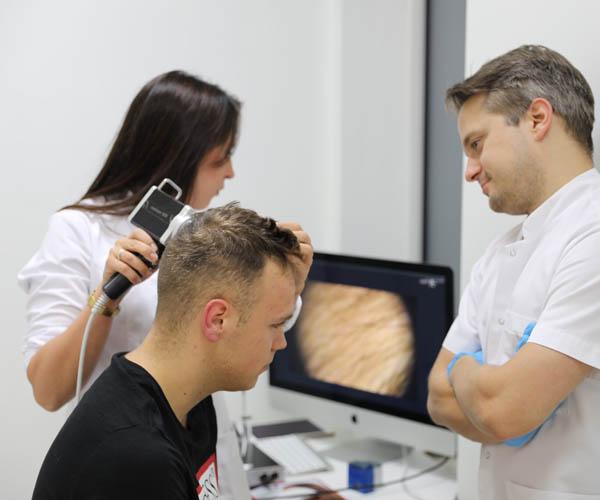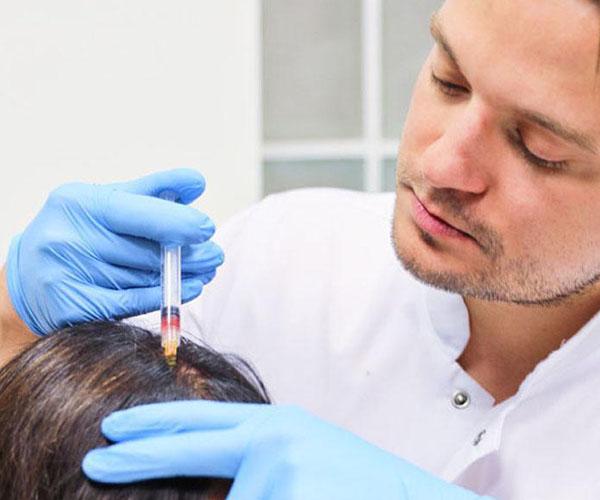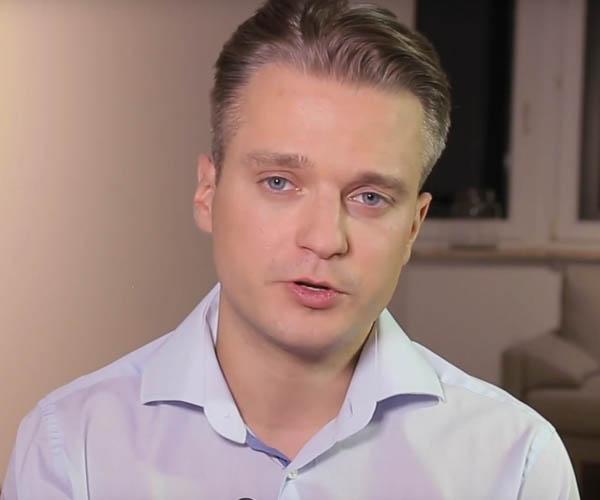Hair loss is a very common ailment that affects both men and women. Sometimes it even occurs in children. In people who struggle with it, it is often the cause of complexes and discomfort. When symptoms are very severe, it can even lead to gradual withdrawal from social interaction.
In our clinic we deal with a very extensive diagnosis of hair loss and its treatment, which is selected individually to the patient. Our specialists analyze the problem very carefully, look for its cause and propose appropriate solutions, each time taking care to maintain the patient’s comfort at the highest possible level.

What is hair loss treatment like?
The most important thing in treating hair loss is diagnosis. The cause of excessive hair loss should be checked. This includes visual inspection of the scalp’s condition, pull tests, light microscopy and other tests.
Very helpful in determining the source of the problem often turns out to be trichoscopy, which allows to see the scalp under multiple magnification and to analyze the condition and phase in which the hair shaft is located. A thorough interview with the patient is also conducted, as the causes of prolapse can be many.
These include issues related to genetic load and different types of baldness, nutrient deficiencies in the diet, too much stress or scalp irritation, which can often be related to the disease.
It is also not uncommon for hair loss to be caused by hormonal disorders and changes, the use of certain medications, or fungal and seborrhea-related diseases.
Treatment of hair loss therefore focuses first on getting rid of the cause of the problem, inhibiting hair loss, and providing supportive therapy such as new hair growth and strengthening the scalp.
Treatments for hair loss include the use of oral medications, topical medications applied to the skin, scalp mesotherapy, platelet-rich plasma treatments, carboxytherapy and, in some cases, hair transplants.
The patient’s hair care and grooming regimen, diet and medications taken, as well as any other medical conditions that may have an impact, are also monitored.

Indications for treatment
Among the indications for treating hair loss are visible thinning of the hair, the presence of bald patches on the head, hairline bends or gradual shifting of the hairline. You should also go for a medical consultation if you observe a loss of more than 100 per day. However, this is a rather imprecise symptom, as it is difficult to determine exactly how much hair falls out per day.
Also, seasonal hair loss and hair loss during naturally occurring hormonal changes over the course of one’s life may warrant a visit to a trichologist. It’s also worth starting treatment if you’re struggling with seborrhea, oily scales or weak and brittle hair. If you suspect that your hair is falling out excessively, it is not worth waiting for the symptoms to worsen. You should go as soon as possible for tests, because early diagnosed baldness is much easier to treat than in advanced stages. Preventive measures can then be implemented to prevent and strengthen excessive hair loss, and the cause of hair loss can be sought even before baldness is visible on the head.
Contraindications to treatment
The doctor decides whether there are any contraindications to treatment. They are quite different for different hair loss treatments. Treatments such as mesotherapy, carboxytherapy and platelet-rich plasma have the least risk of contraindications. Mesotherapy is not performed in people who are forced to take anticoagulants or whose skin is covered by an infection. Contraindications for carboxytherapy include cardiovascular ailments, phlebitis or unregulated blood pressure problems. Plasma treatments are not done during menstruation or when the person who wants to undergo the procedure is pregnant, has dermatoses or is in the midst of a skin infection.
Preparations with minoxidil are not used in the case of active diseases and damage to the continuity of tissues in the areas to which it was to be applied. It is also banned during pregnancy. Glucocorticosteroids are quite a large group of drugs, they can be used, provided that they are properly selected for the specific problem and the particular patient. However, a rather broad catalog of side effects has been constructed for them, so they are not recommended for people who already have ailments that may arise from the use of drugs. Contraindication to the use of finasteride mostly is being a woman of childbearing age. It must not be used during pregnancy and should not be chosen for the treatment of children. Therefore, it is mainly used in men, and in the case of women, alternatives with similar effects are being sought, the use of which will not be associated with excessive risks, but will facilitate getting rid of the problem. Transplants, on the other hand, will not be performed on people with general poor health, scalp diseases or blood clotting difficulties. Before undergoing such a procedure, the patient must undergo a check-up to be qualified for the procedure.
The course of the treatment
The course of therapy in excessive hair loss depends on the individual case and is highly individualized. Each treatment begins with a consultation with a doctor, taking a history, performing a visual inspection of the hair and scalp and, optionally, referring for appropriate tests to facilitate an accurate diagnosis.
For treatment to be effective, the cause of the prolapse must be found and eliminated, so extensive diagnosis is incredibly important. The doctor then selects the appropriate medications and suggests a solution to the problem. He may suggest any of the methods cited or target less popular treatments.
Often, a combination of several treatments together or the simultaneous use of preparations administered on the skin and orally is very effective. Most of the treatment modalities used in excessive hair loss are not invasive, and do not require patients to undergo special preparations or observe a recovery period.
Methods of hair loss treatment
There are many methods of treating hair loss. Some of them can be used in combination with the others, while others should be practiced on their own. Most target different causes of the problem, hence their principles vary. Among the most popular treatments for this bothersome ailment are:
- Platelet-rich plasma treatments for hair – which is a hypoallergenic method that is safe even for allergy sufferers. Plasma treatments improve hair density and condition, and hair loss is reduced.
- Mesotherapy of the scalp – especially needle or micro-needle therapy. It involves controlled damage to the scalp and the application of preparations to the deeper layers of the scalp to inhibit hair loss and strengthen the skin. (e.g. Mesotherapy XL hair )
- Carboxytherapy of the scalp – which significantly improves circulation and microcirculation, allowing for much better nourishment and strengthening of hair follicles.
- The use of preparations with minoxidil – externally on the scalp. It gives very good results for androgenetic alopecia.
- Glucocorticosteroids – used when the cause of hair loss or alopecia is inflammatory, or immunologically based. They are currently the most potent drugs with immunosuppressive and anti-allergic effects. However, their long-term use is not recommended due to the side effects that may occur.
- Taking finasteride or other hair loss medications – which work well when the causes of hair loss and baldness may be due to genetic factors.
- Hair transplant – which is a good solution when hair follicles have been damaged and the effects of the disease become irreversible with the help of other treatments. During transplantation, it is possible to transfer hair follicles from other parts of the body or from the occipital region to the area where hair is missing.
Hair loss treatment in a nutshell
Treatment results
The results of treating hair loss, although dependent on the method chosen and the individual case, are usually satisfactory. Some guarantee immediate, visible improvement, right after the procedure. For others, we wait up to several months for results. However, it is worth remembering that hair loss treatment should not be abandoned as soon as the problem subsides. It’s a good idea to go for regular check-ups later on, as this is an ailment that tends to recur.
A visual inspection of the scalp and hair every few months will also allow early detection of scalp diseases or different types of baldness. While at the doctor’s office, it’s also a good idea to consult your current skin and hair care plan, as well as the cosmetics you use, which, if chosen incorrectly, can also cause excessive hair loss. Proper care, diet and a healthy lifestyle are not insignificant when it comes to susceptibility to many diseases and accelerated hair loss and breakage. A holistic approach to the problem will allow you to enjoy beautiful and thick hair for a long time, regardless of age and gender.
FAQ
Is hair loss treatment effective?
The effectiveness of hair loss treatment depends on many factors, including, most importantly, the cause of the problem. In many cases, it is possible to significantly reduce hair loss or even stop the process altogether, but this is not always possible. In any case, early treatment is key.
What are the treatments for hair loss?
Treatment methods for hair loss vary widely and depend on the cause of the problem. They can include dietary changes, the use of specialized shampoos or conditioners, as well as drug treatments or trichological procedures such as scalp mesotherapy or platelet-rich plasma therapies.
Is hair loss a problem that only affects men?
No, hair loss is a problem that affects both men and women. In men it is often associated with androgenetic alopecia, while in women it can be related to various factors, such as hormonal changes, stress or nutritional deficiencies.
Does diet affect hair health?
Yes, diet has a very big impact on hair health. Hair loss can be the result of nutritional deficiencies, especially lack of protein, iron, zinc, biotin, omega-3 fatty acids or B vitamins.
Is hair loss always a signal of disease?
Not always. Hair loss is a natural process that occurs in everyone’s body. It only becomes a problem when the amount of hair loss exceeds the norm, which is about 100 hairs a day.
Can stress contribute to hair loss?
Yes, stress is one of the factors that can contribute to hair loss. It is worth noting that the effects of stress do not have to be visible immediately – hair can begin to fall out even a few weeks after a stressful event.

